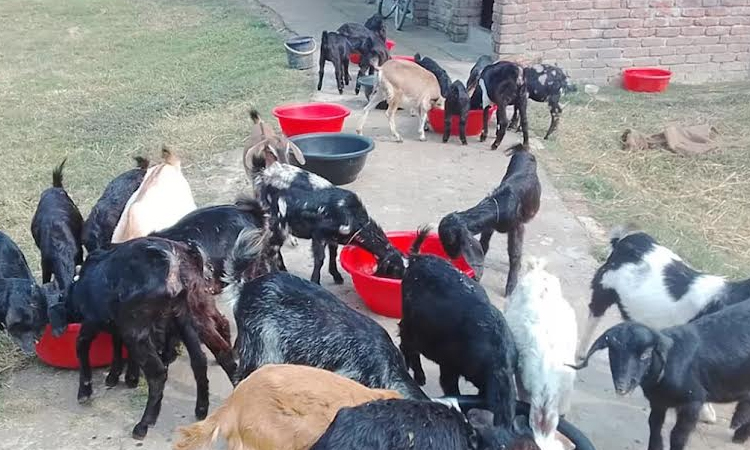News Flash
News Flash

By Md Aynal Haque
RAJSHAHI, April 12, 2025 (BSS) - Goat rearing is significantly contributing to strengthening the rural economy in Rajshahi, particularly marginalized families, as many people have improved their livelihoods by fattening different breeds of goats.
In the Barind area and across the district, goat farming has become popular. Along with beef and lamb fattening, many underprivileged families are turning to goats as a sustainable source of income.
According to the district livestock office, the number of goat-fattening farms in the district has exceeded 100, and the total number of goats raised this year reached 5.26 lakh-an increase of one lakh compared to last year.
Rearing different goat breeds, particularly Black Bengal is contributing not only to economic self-reliance among rural communities, but also to meeting the growing demand for protein.
Prof Jalal Sarder of the Department of Veterinary and Animal Sciences at Rajshahi University, said many grassroots families are commercially rearing different species of goat, particularly Black Bengal, in traditional method. They are quite successful in their venture and earned huge profits every year.
Black Bengal is one of the top five meat-producing breeds. It has a high reproduction rate, delicious meat, leather of international standard, higher life expectancy in the region's climate, he sad adding that it is an effective tool for poverty alleviation.
Prof Jalal said that villagers are now seen fattening goats using natural feeds such as straw, molasses, oilcakes, black gram, green grass, and wheat bran, avoiding harmful steroid tablets or injections.
To expand this potential sector, Prof Jalal called for wider dissemination of modern farming technologies, training on improved breeding practices, and the establishment of more demonstration farms. He stressed the need for skilled manpower and awareness programs on scientific goat rearing.
After failing to get a government job, Sohel Rana and his wife Rima Khatun, a graduate couple from Daulatpur village under Bagmara upazila, started goat farming at their house around seven years ago.
They are now running a goat-fattening farm adjacent to their house.
"This year, we bought 40 kids for about Taka 2 lakh. We've already sold eight goats for Taka 1.80 lakh, and expect the rest to bring in around Taka 4.50 lakh," Sohel told BSS.
Palli Karma Sahayak Foundation (PKSF), a state-owned anti-poverty organization, has been extending financial and technical support to the farmers in association with various non-government development organizations, including Sataful Bangladesh.
Nazim Uddin Mollah, Executive Director of Sataful Bangladesh, said they are providing financial and technical assistance to the village-level entrepreneurs towards establishing goat farms, and many of the beneficiaries have become self-reliant.
District Livestock Officer Dr. Atoar Rahman said the government has also modernized seven public goat farms across the country, including one in Rajshahi. These facilities now include upgraded offices, accommodations, godowns, drainage systems, dipping baths, composting units, and deep tube wells.
Dr. Atoar said they are working to establish demonstration farms, build skilled manpower, and raise public awareness. Farmers are also receiving quality goats from government-run development farms at the upazila level.
The Rajshahi Goat Development Farm at Rajabari in Godagari Upazila is leading these efforts. It focuses on expanding Black Bengal goat farming, improving efficiency among marginalized families, supporting women's empowerment, and promoting bio-security and sustainable livestock development.